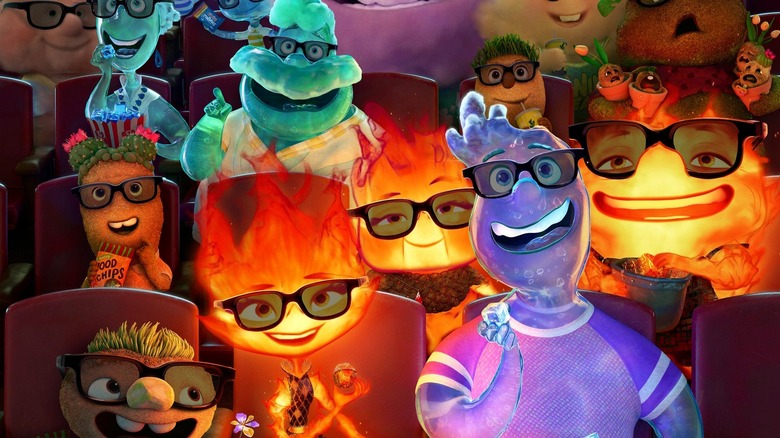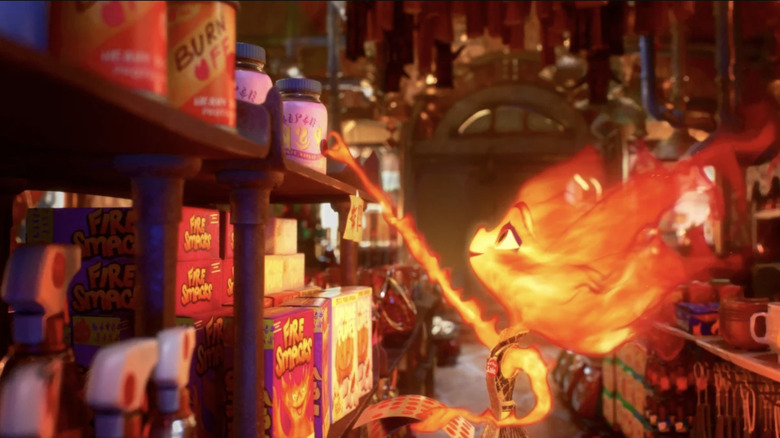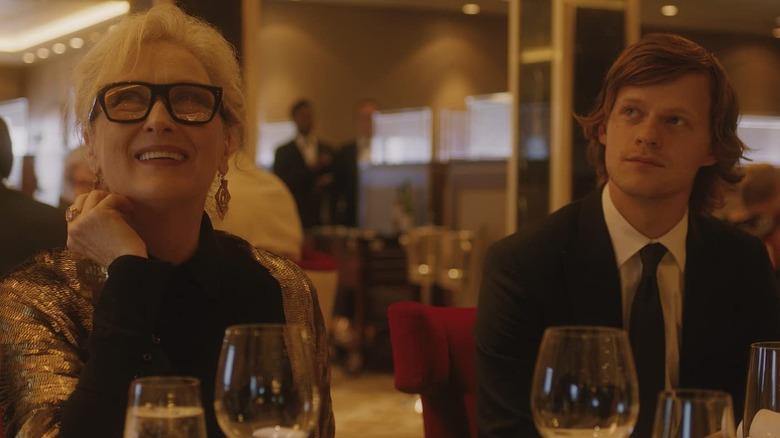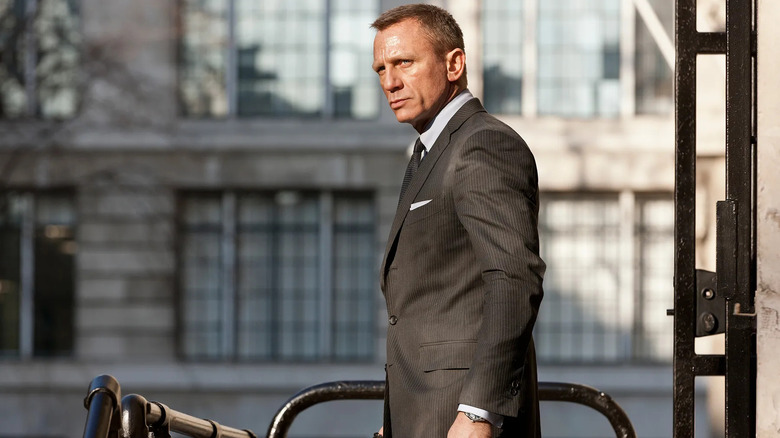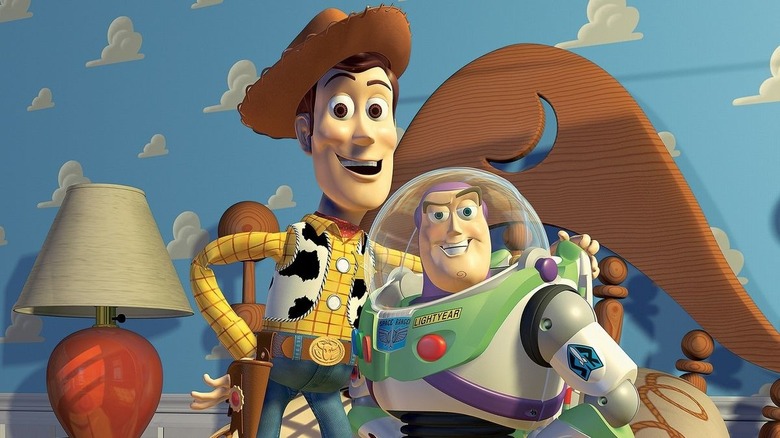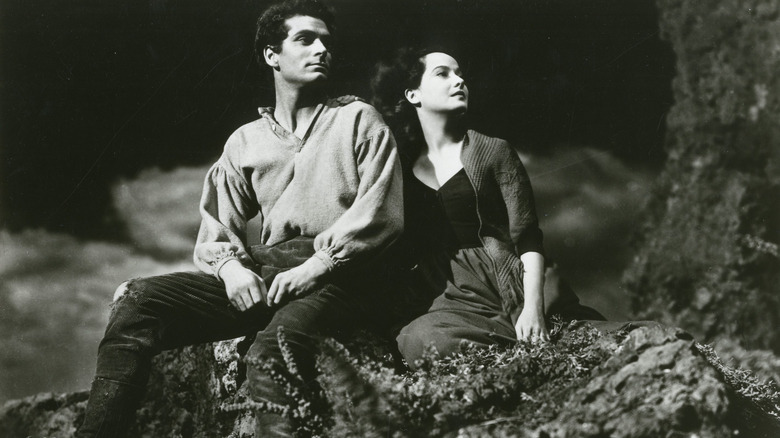Composer Thomas Newman On Scoring Elemental, Bond Films, And The Newman Music Dynasty [Exclusive Interview]
With nearly 93 film credits to his name, Thomas Newman is a certifiable legend in the world of cinematic composition and one of the living members of the Newman Family music dynasty. Trying to provide a snapshot of all of Newman's accomplishments is a fool's errand, but trust and believe he's done it all. "The Lost Boys," "The Shawshank Redemption," "American Beauty," "The Green Mile," the series "Castle Rock," and the James Bond films "Skyfall" and "Spectre" are just scratching the surface of films graced by Newman's musical stylings. He can do it all, because he's done it all, and there are no signs he's slowing down.
Newman's latest score is for the fantastic Pixar feature "Elemental," a culturally diverse story set in a city where anthropomorphic air, water, fire, and earth folk live and foster communities. Newman previously worked with Pixar on the films "Finding Nemo," "WALL•E," and "Finding Dory," and all three scores are held up as some of the studio's very best. Perhaps this is a hot take, but I'd argue that "Elemental" might be Newman's best work with the animation juggernaut, as it effortlessly incorporates sounds from across the globe and brings them together in perfect harmony. Whether it's the frenetic, Asian-influenced "Sháshà r íshà" (complete with vocals in the fictional Firish language) or the jazzy tunes of "Meet the Ripples," the score from "Elemental" was immediately added to my writing playlist.
I recently had the chance to interview Newman to talk about his work not just on "Elemental," but also his favorite "deep cut" score and what it was like growing up among some of the most gifted composers in music history.
Note: This interview has been lightly edited for clarity and brevity.
Avoiding being culturally condescending
"Elemental" is such a tapestry of different cultures, so I'm curious if you could tell me about your process to ensure that the score would not just incorporate all of these beautiful global sounds, but do so without it feeling like cultural shorthand.
It was challenging because the last thing I'd want to be is culturally condescending or, well, maybe I should say that I didn't want to come from a cultural sensibility so much as reach out from a creative environment and touch certain cultures. There was going to be no way to avoid just using many different instruments from many different cultures because that's the parallel world. I mean, there is a parallelism in the imaginary world of this movie and Earth, obviously. So how could you make that work without going too far and drawing musical conclusions that you didn't mean to draw?
After lots of thinking about this, I just decided that I would approach it from the bottom up and go to certain scenes, work with the players I worked with for a long time, bring up different colors, patterns, et cetera, and just see what worked. And then play those for Pete Sohn, the director, and see what remained and what needed to happen.
I know that David J. Peterson helped craft the Firish language for this movie as well, and some of the songs in this score incorporate Firish as either singing, rapping, or chanting. What is it like to write a song with a language that is essentially made up?
Yeah, I mean, I think that was casual in terms of some of the rap stuff that you would hear along the way, [like] when Ember is doing her deliveries and stuff. But again, I think it was all more intuitive than it was intellectual, and I wanted to keep it that way as opposed to really thinking it through because I knew that thinking it through was just going to get me in a lot of trouble in terms of how to make progress and how to be honorable. And as I said, non-condescending.
Newman's favorite 'deep cut'
Something that I've also really loved about the work of composers especially is that composers have the widest filmography. You've done everything across the board, but what genres are most exciting for you to score?
I mean, I like psychological drama. There's something wonderful about writing a score that's maybe 25 minutes and that there's no music for 15 minutes and suddenly music comes in. It really elevates and then it goes away. And that it's not turning every corner. But a lot of the movies I've done recently, I guess, have been essential to write larger scores. Some of the Bond movies that I've done and obviously animation really require a lot more music, and I love that, too. So I mean, I don't know that there's any genre that I prefer. What I always want to do is work on a movie that I find interesting and that I can be expressive and feel like there's going to be some joy in the making.
I'm glad you brought up the Bond stuff because you've scored everything from teen sex comedies to Bond movies to Pixar films ... just everything. Do you have a deep cut in your filmography that would surprise people to know that you composed?
I did a movie for Steven Soderbergh called "Let Them All Talk" which was big band. And I collaborated with an amazing musician named John Beasley, an amazing pianist and arranger. But it's so different. It's all live and it's just a lot of fun.
I love that.
And I bet people don't know as much about that or that side of [my work].
The difference between scoring Bond and Pixar
One of my favorite deep cuts of yours is "Welcome Home, Roxy Carmichael."
[Laughs] What year is that? Is that the late '80s or...
Early '90s! It's in that sweet spot where Winona Ryder was becoming the "It" girl.
Right, right. Man. You remembered that!
We've got your score. We've got Melissa Etheridge, that was everything that I needed as a young kid. So, you've done these deep cuts and smaller films, but you've also got legendary films. When crafting something for a Bond movie, is there a key to crafting that sound?
Yeah, typically. I mean, with a Bond movie, there's just no way around that. I mean, it's such a great tune. I mean, the whole Bond thing is just so satisfying, so deeply satisfying, that to deprive an audience of it, it's just slightly ... I think maybe one movie, I don't even know which one it was, didn't use the Bond theme ever. So yeah, you're going into a movie like "Skyfall" or "Spectre," you know that you have to scratch that itch and that the franchise needs it. It's part of the very essence of what it is to be in a movie theater when you're watching a Bond movie. And then that's slightly intimidating, because the tune is so good and because you want to honor it, and you want to honor however many years the Bond movies are being made.
And does that differ when you get into a world like Pixar? Like, Pixar is very much an institution, but the stories are all different. Is there a unifying sound?
I would say no. They're a very, very creative organization and they have worked out a manner of letting directors ... I've heard the phrase, "Give the director the key to the Ferrari," and you drive it, and whatever the movie is, it really wants to be designed for that movie.
Obviously, I think the key to a lot of Pixar's success has been that it's very satisfying to many ages all at the same time. So it can't dumb down. I don't think you dumb down a Pixar movie. And I wondered that when I did "Finding Nemo," like, "What does it mean to have a vocabulary for an animated movie? Am I changing the very essence of who I am because this is something different than I've ever done before?" And the answer I think was really a resounding no. That the drama still wanted to be served in whatever way, in whatever unique way to that movie. That was wonderful to learn.
Being part of a musical dynasty
So you've been composing longer than I've been alive, and you've done so many incredible things. How do you stay inspired? How do you keep yourself from, I guess, self-plagiarizing after all these years?
I guess staying interested and remembering that you hope the movie you're working on is compelling and that you want to make the movie the best that it can be. And you want to see different ways you can solve issues of the drama with music. It still just delights me to get with players and to make it. I don't know what I'd do if I wasn't doing it.
You are also from a legendary musical family. Does that add an undue pressure to what you do? Because it's not just your career, it's also this familial legacy. Or is that a perk?
It wasn't a perk, to begin with. It was a long shadow. My cousin Randy, and of course my dad [Alfred] and my uncle Lionel, my uncle Emil, it was like, "Yeah, how do you find a voice?" That was daunting at first. There was a moment though, sometime in the '90s, where I felt I had found a voice that was different than my dad, was different than Randy's. I developed relationships with players. I felt like I was someone different than just the Newman family. And then I started being proud of it.
Oh, good!
And then feeling like I really had come from an interesting background. I mean, my dad began in Hollywood, I think in 1930, and worked with Charlie Chaplin on "City Lights" and "Modern Times." And it really was a legacy and something to be proud of. And of course, he died when I was quite young, but it was still a real measure of pride to hear his music and to see how he had changed film music. He had been there at the beginning. I mean, it's like, wow, pretty amazing.
The Mount Rushmore of Newman family music
This one might be a hard one, but if you had to choose a Mount Rushmore of the Newman family music, what do you think are the essential pieces?
Oh, man, you should've given me this question before! [laughs] Cathy's Theme from "Wuthering Heights" would certainly be one. Any Randy Newman song. For me, I mean, Randy Newman is godlike in terms of just the American songbook, whatever he's given to that. How about two instead of four?
That's fair! I mean, I'm asking you to choose from like, a century's worth of music.
Yeah. I was thinking, I wonder for how many consecutive years have there been music composed by Newmans? I mean, if it's been every year since the '30s, I don't know.
I mean, I guess I'm going to have to do that research when we're done talking today.
I should do it, too.
I'll figure it out for you. [Note: I figured it out after the interview. It's 87 years.]
It's a big family. I mean, my dad was the oldest of 10, and lots of kids, lots of cousins and stuff like that. And then new generations are getting into it as well.
That's wonderful. So my final question for you is that the landscape of music, and what we consider music, has expanded so much with the advent of technology. What are some of the exciting things that you're seeing?
Probably that technology has democratized anyone's ability to be imaginative and to take that imagination musically and put it next to image. That has to be a good thing. It takes away a certain elitism that a certain amount of people with a certain amount of resources used to have and that many other people didn't. But also this notion of what it means to be educated in music — and by educated, I mean formally educated as opposed to knowing, "I have talent. I don't read music, but that really doesn't matter anymore," and suddenly some great new ideas can get behind image. That has to be a good thing.
Agreed completely. And I feel that my very average musical theory grades in high school are relieved to hear that. [laughs]
Me too, by the way! [laughs]
"Elemental" is currently playing in theaters everywhere.
